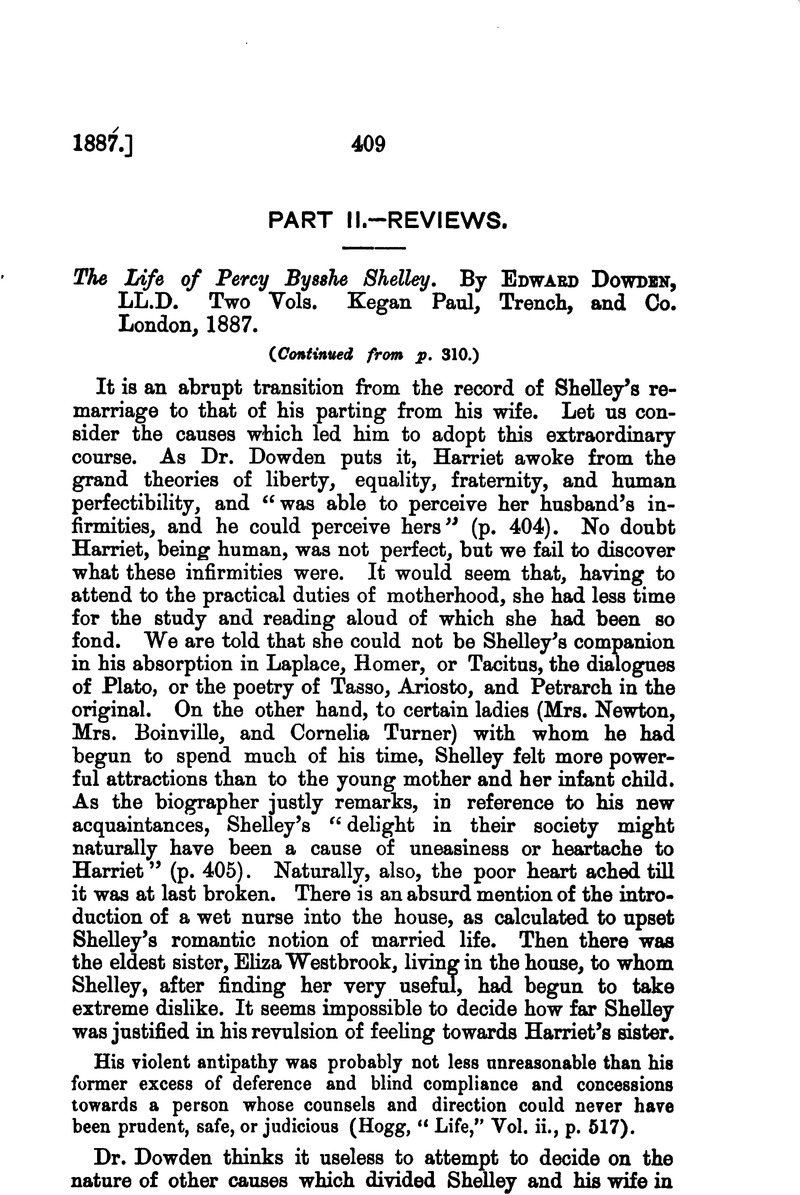No CrossRef data available.
Published online by Cambridge University Press: 19 February 2018

* In her own hand writing, in poems Shelley prepared for printing.Google Scholar
† The original poem, “Laon and Cythna,” re-named and modified in consequence of the protests of his own publisher and friends, ought not to be overlooked as an indication of extraordinary moral perversion. Dr. Clouston has spoken of Shelley as a man “whose abilities were far above the average, but whose moral qualities and volitional powers were twisted and perverted” (“Journal of Mental Science,” April, 1887, p. 163). Mr. T. Hall Caine writes—“The man who could regard as a vulgar prejudice the sacred instinct that holds a brother and sister at once together and apart …. the man who did not shrink from asking the wife he had abandoned to share the society of the woman who had supplanted her, was a man who could have no moral nature to endure a collapse.”—”The Academy,” December 4, 1886.Google Scholar
* Mr. J. A. Symonda (a warm admirer of Shelley) argues conclusively “that it was not until 1817 that the suspicion of Harriet's guilt before the separation arose. This suspicion, however, did not harden into certainty, nor was it found capable of verification; else why did not Shelley use the fact as he proposed in order to strengthen his case against the Westbrooks?” It is a most striking circumstance, and Mr. Symonds justly lays great stress upon it, that between June, 1814, and May, 1815, there is no iutiuiutlon whatever in any journals or letters of Mary, Miss Clairraont, or Shelley himself, nor yet in the conduct of the Godwin family, that any of them supposed that Harriet had wronged her husband at the early period at which it was afterwards alleged that she had. Then there is the fact of Shelley actually inviting his wife to join Mary and himself during their Continental honeymoon. Mr. Symonds points out with great force that Mrs. Shelley (Mury) in her novel “Lodore,” which is allowed to be her version of Shelley's relations to his first wife, desoribes her gradual alienation from her husband without breathing the slightest suspicion of her mis behaviour. Mr. Symonds puts the whole case in a nutshell when he says :—An, irresistible passion for another woman had suddenly sprung up in his heart. Upon these grounds, after undergoing terrible contention of the soul, he forced on the separation, to which his first wife unwillingly submitted.” (“Fortnightly Review,” April, 1887.)Google Scholar
† It does not follow that because a man keeps a diary he enters everything that happens. Harriet may wull uave called ou tuo UoJwius previously.Google Scholar
* A biographer of Shelley, certainly not wanting in appreciation and praise of Shelley, thus expresses himself:—“If a reunion of heart with Harriet was possible before, it now became impossible. Shelley fell helplessly in love with Mary; quitted Harriet; offered his heart-homage to Mary, &c., &c. …. Poor Harriet, who had behaved well to Shelley according to her lights and opportunities, was much to be pitied, and as yet in no way pointedly to be blamed.” “Harriet was a frank, kind, nice girl, and in all ways worthy of any ordinary man's love” (“Shelley's Poetical Works,” pp. 15, 17, edited by Kossetti). But more than that, we have ample proof from Shelley's own state ment that she was worthy of an extraordinary man's love also. Hor fickle husband had addressed lines to Harriet in 1813, in the dedication to “Queen Mab,” which speak for themselves.Google Scholar
Beneath whose looks did my surviving soul
Riper in trouble and virtuous daring grow?
* * * *
Harriet! on thine; thou wert my purer mind;
Thou wert the inspiration of my song.
* * * *
Then press into thy breast this pledge of love;
And know, tho' time may change and years may roll,
Each floweret gathered in my heart
It consecrates to thine.
eLetters
No eLetters have been published for this article.